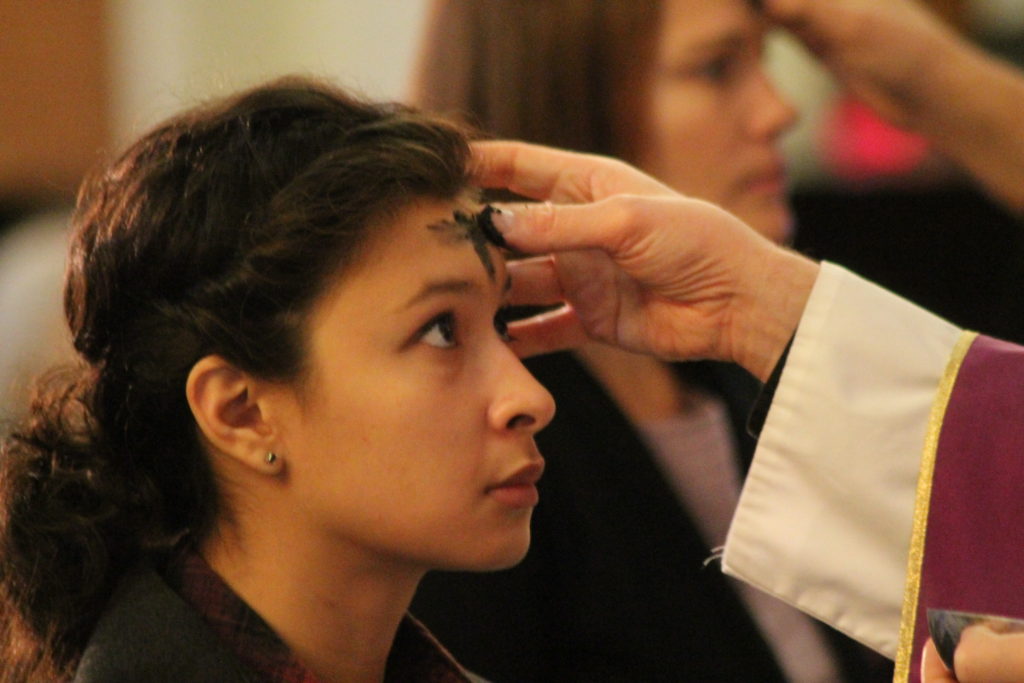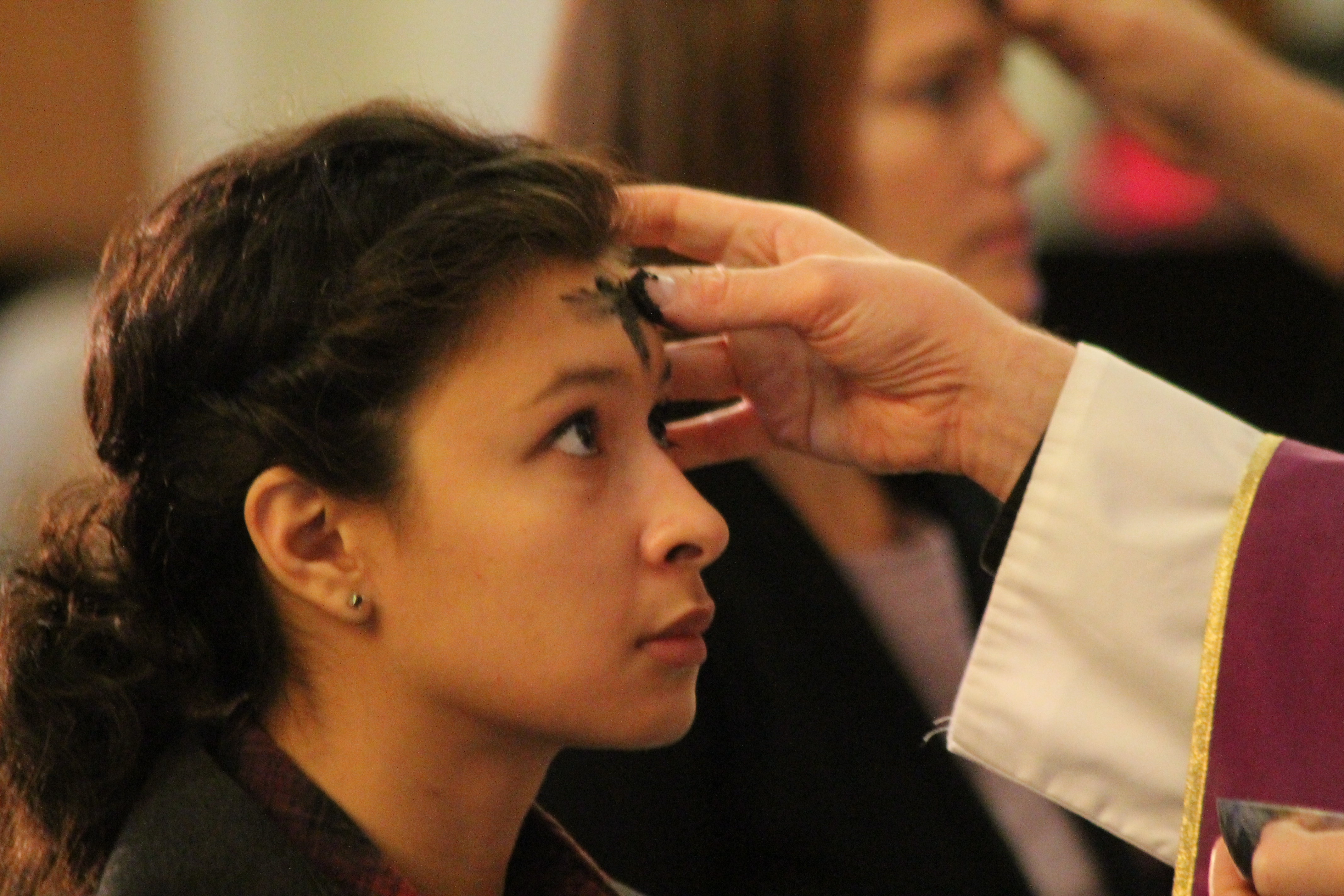
[dropcap type=”4″]T[/dropcap]he season of Lent is a time to grow in our relationship with Christ through increased prayer, acts of charity, almsgiving and fasting. Acts of self-denial such as giving up television or dessert can help the faithful grow in self-discipline and solidarity with the poor.
The holy season of Lent commences with black ashes on the forehead in preparation to celebrate the mystery of the cross.
These 40 days prior to Easter are a time for Christians to sit with the messiness of life and then transform it through the three pillars of Lent: prayer, fasting and almsgiving.
“The focus is God wants to renew us — always — and in His love for us, raise us up. Keep your eyes on Easter and then everything that takes place in Lent keeps its meaning,” said Fr. Dale Craig, SOLT.
The pastor of Most Holy Trinity Parish said Lent is a “gift” that needs preparation of the heart in order to know the desire of God.
“It is an opportunity of grace, an opportunity to grow, an opportunity to deepen our relationships and an opportunity to heal,” Fr. Craig said. “All these gifts come to us during the Lenten season.”
The number 40 has special significance in salvation history, representing change or transition; it was the number of days water flooded the earth, the years Israel wandered in the desert and the days Christ was tempted and fasted in the desert.
“So we take these 40 days of purification to enter into preparation into new life God has waiting for us,” Fr. Craig said. It’s contemplating how “Christ gives us hope, forgiveness and new life through the cross and through His mercy.”
It is an annual journey to prepare for the great feast of Easter, Christianity’s most fundamental belief that Jesus was raised from the dead and is the Lord of all.
[quote_box_right]
Related: Lenten inspiration
Related: Pope Francis on Ash Wednesday
[/quote_box_right]
Lent is different than any other time of year beginning with the practices of abstinence, fasting and sacrifice that are designed to bring God to the center of Christian life.
The Church requires that Catholics over the age of 14 abstain from meat on Ash Wednesday and all Fridays of Lent.
Additionally, all Catholics who are 18 and older, until their 59th birthday, are to fast on Ash Wednesday and Good Friday by eating, at most, only one full meal and two smaller ones.
Fasting and abstinence are acts of penance that unite Christians to the sufferings of Jesus. This act of self-denial not only draws attention and unity to the hungry but also strengthens character.
“We forget how much we have and the Lord wants us to sacrifice more to understand the true blessings in our life,” said Fr. Will Schmid, pastor of St. Mary Magdalene Parish in Gilbert. “Our souls hunger for more in this life and what the Lord has waiting for us is better.”
In preparation of Christ’s triumph over sin and death, Lent’s attitude of conversion and turning back to God is a personal journey and Catholics are asked to make going to confession a significant part of their Lenten experience. Through the sacrament of penance, the faithful are drawn into the loving arms of God. Many parishes offer extended hours for confessions as well as communal penance services.
For those who have been away from the confessional for a while, it might seem daunting, but it’s important to keep in mind that confession is where healing of the wounds caused by sin can take place. That woundedness impedes our relationship with Christ, and Lent is all about growing closer to God.
“It’s a gift to come to a deeper and more profound relationship with Him and others,” Fr. Craig said. “You get out what you put in. Our goal is not to just endure our sacrifices but use it as a means to come to a deeper holiness. Ultimately, the Christian journey is for the purpose of deepening our relationship with God, neighbor and self.”
Msgr. Michael O’Grady, the now-retired rector of Ss. Simon and Jude Cathedral, suggests “picking up prayer life” by reflecting on the Gospel readings or attending an extra Mass. Giving alms to organizations that feed the hungry, shelter the homeless and care for the needy is an integral part of the Lenten season too.
Showing acts of charity is what Jesus asked of everyone through the corporal and spiritual works of mercy.
“Become a little light for somebody,” Msgr. O’Grady said. “Love better.” Lent is also a good opportunity to pray before the Blessed Sacrament in one of the diocese’s adoration chapels, such as the one at St. Mary Parish in Chandler.
Fr. Dan McBride, pastor at St. Mary, said the silence of the chapel can help us tune into God’s voice.
“You’re listening for that little voice of God that calls you and whispers somethings in your ear that you don’t hear if the world is yelling at you every minute.”







